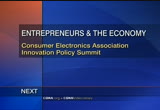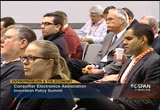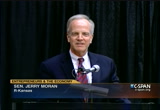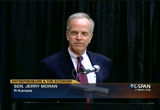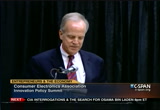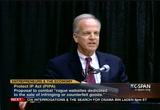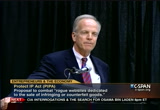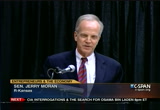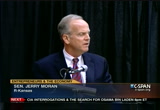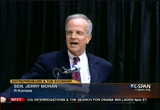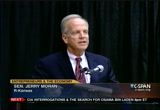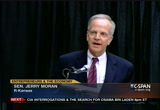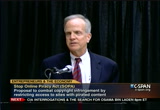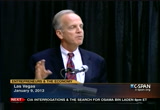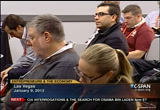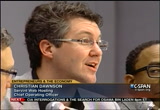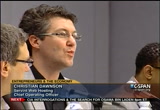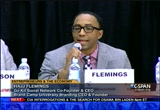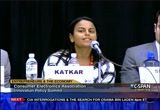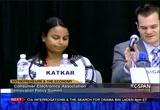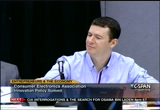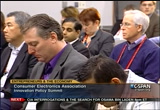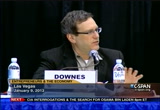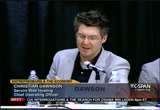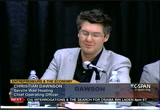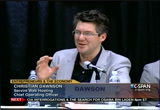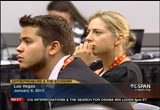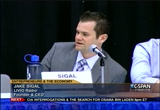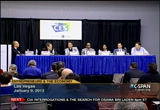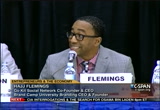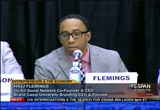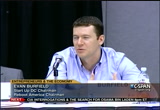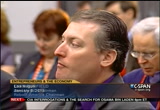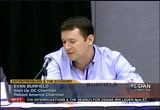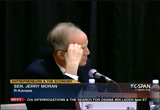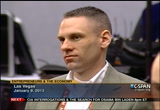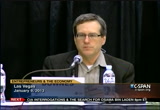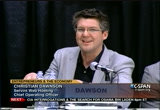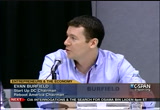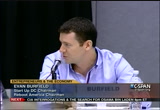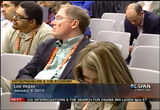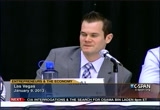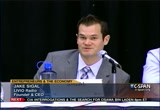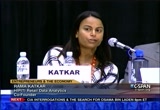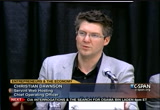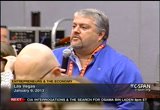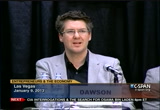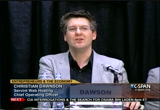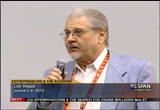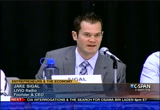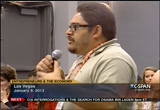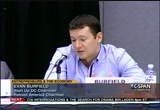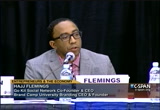tv Startup Companies CSPAN February 2, 2013 7:00pm-8:00pm EST
7:00 pm
start a businesses create jobs and spur the economy. we will hear from jerry moran who authored the start impact, legislation aimed at helping businesses grow the economy. this discussion as part of a policy summit held by the consumer electronics association in las vegas. it is an hour. >> so, good afternoon. my name is larry downes. it means for an hour i can be up here and not back in the audience taking notes. just before the election, i wrote an article asking what it was that of intrapreneurs needed from washington. our panelists today may have a more productive agenda to discuss. i know there are many in the audience who are from washington. that is great because you will
7:01 pm
be hearing from some actual business owners and organizers -- organizations interested to talk about when the start up a economy does and does not need from washington. it is my great pleasure to introduce senator jerry moran will provide some introductory mar remarks -- remarks. both in the senate and then before 2010, and during seven terms in the house. he successfully led opposition with senator biden to defeat the protect ip act. that was the senate version of sopa. he has encouraged congress to develop a spectrum policy as well. senator moran is the author of the start pact. these are bills that the seat to unleash the job-creating power
7:02 pm
of entrepreneurs to grow the economy. please welcome senator moran his first ces. [applause] >> thank you very much. thank you for the introduction and our panelists. i am anxious to get your instructions and hear your direction as what we should be attempting to accomplish. this should be an issue that does not divide us but brings us together. i hope that is the case in 2013. i very much appreciate the consumer electronics association hosting this tremendous trade show. i have been able to wander the floor this morning looking at the latest ideas and examples and innovation. it strikes me this is the area of the economy that has the grid -- greatest potential of growing and has the most to offer as far
7:03 pm
as job creation and it is the part of the country -- the economy that is least likely to be regulated by what happens in washington, d.c.. it is clear to me the evidence is that with less government intervention, the likelihood of innovation and economic success only increases. that is a concept that i think needs to garner greater support across the country. i got interested in to this issue of entrepreneurship as a frustrated member of the senate. only a short time into my time in washington as a senator, it became clear we were accomplishing so little. one of the motivating factors for my interest in seeking office and continuing in public service was a belief that the
7:04 pm
fiscal condition of our country is very challenging, the circumstances in which our kids have less of an opportunity to pursue the american dream they would otherwise have. i saw no success on doing anything in regard to revenue or reductions in spending. there is a litany of things that would show that was not taking place from the president's budget to the raising of the debt ceiling and creating the select committee, no evidence we were able to achieve something. while i have not walked away from those issues, i did see the conclusion, maybe there is a different approach to getting our country out of the fiscal condition it is aimed, growing the economy, job creation. at about that time, a report from kansas city is devoted to
7:05 pm
entrepreneurship. that landed on my desk with recommendations about what washington might do in order to enhance the chances that the united states is and would remain a country of entrepreneurs. we took those ideas and began the process of drafting legislation. at about that time, senator wide and introduced himself and said i have an issue that might be of interest to you. would you care to team up with me? we spent a short amount of time analyzing the issues of sopa and pipa and realizing much of the job growth and the additional revenues to the treasury or occurring because of the innovation of the technology sector. certainly start of companies can be from the person that decides it wants to open a dry cleaners to the latest in technology that
7:06 pm
originates and we see here at this trade show. where the greatest success seem to be was in the innovation arena, that technology arena, and it appeared to me that government was about to make a decision that was going to limit the opportunity that innovation would have for the economy. and did not expect to have much success, the allies, they were on the other side of the issue. significant players, both in congress and outside. if he was in the room, i would give him full credit for the success. the reality as it was the community the decided they were going to participate in making their position known and felt in washington, d.c. as a result, what was unexpected became the outcome, the unexpected outcome of
7:07 pm
stopping sopa and pipa was the success we had as a result of citizen participation. i hope that at victory is felt that democracy is still alive and well. a person's. of you can be heard and make a difference. that outcome was the expectation was a different one than what we had. that lent itself to another aspect of innovation, but my interest in the topic really was a belief that technology is a great opportunity for us to grow the economy. i happen to serve on the appropriations committee in the senate that has the fcc's budget. about that time, spectrum issues arose. we began to understand the value
7:08 pm
of additional spectrum. it was one more piece of the puzzle as to growing entrepreneurship in the technology world. it was no grand design about my arrival in the united states senate, but they believe we should grow the economy that resulted in reading the report from the foundation, listening to the center, and realizing that spectrum was an important issue. because of my position, i had an opportunity to influence the decisions the fcc would make in my colleagues would pursue. in that position, on the same subcommittee, we got interested in the jobs? . it is discouraging to see so little has come from that legislation. it is discouraging because it is an example of where we came together, passed a piece of legislation that has significant
7:09 pm
potential to grow the economy and to raise the capital necessary for startup businesses. we have been unable so far, and that would be front and center, a conversation for me. i expect to be on the same subcommittee. as a result in the election i will not be a chairman but will be the ranking republican where we hope to influence and to make decisions that are beneficial to raising the capital necessary. let me highlight the startup act, now called the start up to. zero -- 2.0. our first choice for a colleague was senator mark warner of virginia. we made the case for this kind of legislation and we work out
7:10 pm
differences between what he thought the bill should say and what i thought they should say and we reach an agreement and then we wanted to broaden its support and reached out to marco rubio, who had introduced legislation regan -- related to business issues and we brought some of their ideas in an expanded our group to four. we are at a point in which this legislation, we need to get off the diamond we need to make certain it is a top agenda item for 2013 in washington, d.c.. this legislation deals with access to capital, again with the regulatory environment, perhaps most important, it deals with the issue of the battle for talent and our insane policy in this country of educating individuals that have great
7:11 pm
talent and intellect and then telling them they have no opportunity to pursue careers in the united states. also to recognize that many first-reneurs, are generation americans or early arrivals in our country. there are visa provisions that allow for an increase in the number of stem visas but also for those that are foreign born but that one to create business and the united states. in addition to that, we believe that having some competition among states through information and knowledge will increase the opportunity for entrepreneurs to decide where they can start with a new idea and beginning company. -- begin a company.
7:12 pm
i hope what we learn from a community's efforts in regard to sopa and pipa with a demonstrated they have the ability to stop legislation, i would love to see the circumstance in which they have the ability to promote legislation to see that in his past. we are taking the approach that this legislation is not perfect. seeking input from you and others, i have been to south by southwest, and silicon valley, increasing the level of information by those who can help us. but ultimately the goal is to have those people buy into legislation and to use the same techniques that demonstrated the political power of the internet to stop the bad legislation to demonstrate there is political power in the internet to promote positive legislation. just to try to summarize, this matters because we are losing
7:13 pm
the battle for entrepreneurship. it was sad to me to have a business person tell me the american dream is alive and well around the globe but that the american dream is more likely to be pursued outside of the united states. in fact, in the two years i have been a member of the senate, seven countries have changed their laws where we have not, to try to create a circumstance in which they are more likely to attract new business. including in the global battle for talent. that list of seven countries, one of them is chile. 20% of the companies they promote our u.s. companies who decided it is better and to pursue that business there and then in their home country.
7:14 pm
this is the basics of what we should be doing and creating environment in which those that want to pursue that idea with the hope of success have the ability to do that and are not damaged by doing that in the united states. in some instances we hope they will be rewarded by doing it in the united states. i am very interested in seeing what the panelists say that the 2013 agenda should be for the new congress and pledged to the start of community and others unwillingness on my part to be educated and to learn and listen and to try to make certain decisions that i make in washington promote the ibm of a free-market system that allows all americans to pursue the american dream in the united states. thank you for joining us and for your interest in this topic. [applause]
7:15 pm
>> that was a great introduction. the senator is going to stay with us and listen. what i have asked the panel is to deal is to give us a brief introduction of who they are and what organization they represent. from there we have a number of topics we want to cover. some overlap and some are unique. let me start with you, christian. >> thank you. i am from the internet. we all use the internet every day but i get to say that he and my team actually created a pocket of it. we are all entrepreneurs. i am not a start up. what i do enables the start-ups and gives them a platform on which to build their dreams and generate the economy. my company is called servint and
7:16 pm
we have been around 17 years. web hosting is a part of the infrastructure community. we have a trade association of which i am a part. data talking about centers, claude providers, the notes and bolts of the internet that sit on top of the infrastructure. there are 30,000 companies like cars worldwide. we are mostly small to medium businesses. most people think the internet is amazon.com and google, microsoft, abel, those are the exceptions. rule is small businesses. small businesses that are in power in small-business is. -- empower small businesses. that is why we're here.
7:17 pm
>> how is everybody doing today? i am from detroit and i run a couple of start-ups. i spent most of my day working on a university. what we do is help start-ups to be able to leverage technology to tell their stories online. this to give you some background, i have the opportunity to be a part of being in the silicon valley. but there really is, it opened my eyes to this whole ecosystem and how the world works. the perspective by want to bring is how do cities and states change their minds from an investor perspective? i'm from detroit and if you look at detroit, detroit is changing. how does a town that has been a factory town reinvent itself? how does it disintegrated tried
7:18 pm
to create high growth and jobs and a place where now we have to get the local government and we have to get the community working together? i think he now did on the head when he talked about leaders. talking about how entrepreneurs are going to lead the movement. but we need to have an infrastructure, whether that is government and universities working together so we can create an eco system and make sure that it is sustainable. an excited about meeting with you today. i look forward to the conversation. >> small-company is called hippidy. we are based in san francisco. we are one of the small companies christian mentioned. we are only six employees right
7:19 pm
now. our company does a lot of pork with national retailers, services, aggregating data and building technologies in terms of when sales happen, algorithms in terms of selling at two different parties. one of the areas of concern for a company like ours is access to talent. my parents are immigrants. it is something close to me personally. many of my family members have gone through this process. . being able to work at a smaller company that has the ability to do that in the u.s., that is a topic of interest to me and some of the others. i look forward to chatting with you about it. >> i am also from detroit. we get apps on to your smartphone safely. i started my business in 2008
7:20 pm
with a fresh set of business card and started giving them out trying to figure out what i wanted to do. five years later we have 20 jobs in detroit and we work with major companies. which is great. i usually keep my head down and i try to avoid anything that does not involve closing deals. but i have a lot of struggles when it comes to hiring. i am happy to talk about that. i have also been through the ranks with angel financing. so i have been through it and i and stem the challenges and businesses go through because i have been there. i definitely keep my head down when it comes to washington and focus on things that mattered to making payroll. >> first of, thank you, senator for opening this up. been jobs act is a remarkable
7:21 pm
piece of legislation enacting making sure this community can support the work you're doing, i think is critical to capital raising for a lot of start-ups. i am part of the start of the american network. i've lost my first company 1 i was 19 and have raised capital in a variety of ways. we are really focused on what we can do within the washington, d.c. a ecosystem to relieve bridge the gap between a startup-led innovation and a lot of the expertise and connections that exist within washington, d.c. the first aspect of it is important but there is a broader view that one of the biggest opportunities for innovation our country is looking at is how do we reinvent the way we educate our kids? or provide health to our
7:22 pm
citizens? or manage transportation? these are big issues and issues in which we have a significant amount of opportunity to disrupt and innovate. the leadership is going to come from start-ups. they need to be able to understand how to actually connect in these environments to drive that innovation. that is a lot of the stuff we're doing, focused on creating a community. theet's get into some of topics. we heard yesterday and today about some of the immigration, patent reform, but let's talk about it from the standpoint of people who are in the trenches. christian, give us a sense of a framework using start-ups would like when washington thinks about regulating or not regulating. order some of the guiding principles that should be included? >> i made you guys a short list.
7:23 pm
first i want to basically say that, well, remember when that guy columbus discovered that the continent? the internet is kind of the biggest thing since then. we need to realize that old ways of approaching legislation are not going to work. the first thing we need to do is to get congress to acknowledge nobody knows -- owns the internet. attempts to do it are going to generally fail. people do not understand how vast the internet is. it is not like telephone lines. no group will have a singular perspective to understand it enough to legislate it. there are existing methods to shape the internet. groups like wwc, ift, they take aspects of the internet and they bring stakeholders to the table with different perspectives, and a price, governments, content
7:24 pm
creators, users, internet providers like me, all come to the table and a hash out the differing perspectives. basically, you need to do work to be able to pay attention to. what the government can control, they need to understand it is very limited. ultimately, i will go ahead and read my lips. we want, any regulation should be placed with specialized expertise in the area sought to be regulated. for instance, the s -- ftc had some experience and they listen to us. we may want to talk with them. they have dealt with sakharov. yes, we do not want an internet agency. we do not want in internet czar.
7:25 pm
the government should reinforce than working with entities, or considering legislation or activity that would undermine it, like the domain name creatures. that really hurts us. we do not want people to stick to failed negotiations, like the ttp. we want support for the communications decency act. we do not want blacklists and what lists. and regulation should continue to be technology neutral and any regulation should expressly and brought the preempt state regulation. right now we have the swiss cheese mess that is impossible to go through. we also need to use language that is explicit and easy to follow. that is another problem with a lot of these bills. we just do not understand what is your talking about. if we do not understand what you're talking about, we cannot tell you whether we are pro or con.
7:26 pm
at dinner that they come here is what you need to realize. on copyright, privacy, security, the u.s. is not the only game in town. i lose business everyday to overseas. right now, our industry represents a trade surplus. more people are coming to do hosting in the united states to build their businesses, then the reverse. but we still lose it because people outside of this country use, for instance, the patriot act against us and say, because of that regulation that cannot be in the united states. the more restrictive legislation we put on our soil, the more people are going to take their business and start them on everyone else's infrastructure. losing infrastructure to overseas is a gateway to losing innovation altogether. you say i am already in the netherlands, now i can outsource this.
7:27 pm
we can prevent that with open dialogue in all seats at the table. >> those are some good first principles. does anybody else want to add or disagree? ok, let me -- using that as a framework, let's talk about some of the specific issues. i will start with jake. you mentioned capital. what are some of the problems or opportunities you have in terms of raising capital, ways in which washington helps by doing less or more? >> there are two issues i want to cover. the first is that investors may be free to put money into what they choose to and providing any sort of [indiscernible] -- barrier creates a problem. this is for angels. these are individuals that want to put money into companies. they need to be able to do that without any penalty.
7:28 pm
the second issue of is that a federal and state level. in my experience, in michigan, if you are not making cars, you are not getting funded. that has changed quite a bit to add three more categories. if you are not in cars or health care then you're not getting funded. i think that is wrong. i think we need to look at this and say, where is innovation going to happen? you mentioned about detroit, you have to think outside the box. investors are highly qualified to do so. putting limits on what they invest in and providing incentives creates a problem. it is not what i would consider free-market and allowing people to invest to make this country great again. >> anybody else want to chime in on funding issues? ok. let's move on. we might as well stick on
7:29 pm
detroit. i am also from detroit. let me come to you, hajj. company,pany, jake's what kind of things to your experience from the local government that makes it easier or more difficult to keep innovating outside of silicon valley? >> if you look at any place like detroit, we are going to have to -- it will be harder to attract a microsoft or an amazon. so we are going to have to focus more at being the economic guardian. what are the companies, whether the entrepreneurs in the community to create an environment so they want to stay there? a couple of examples. we have some who are doing good stuff. dan gilbert has purchased quite
7:30 pm
a few buildings, probably 26.5 million square feet in the city of detroit. he has been able to attract twitter and other companies. there is another gentleman the purchased this building that was foreclosed in a blighted part of detroit and it is now creating this collaborative work space. i think what caps to happen in detroit, is that local government has to be able to support environment to be able to get together and collaborate and create some really interesting things. so that is how we're going to be able to more forward. something to think about, there is this multiplier a fact that happens when you have this kind of activity. you start to have other businesses. you start to attract other like- minded companies. i think from our standpoint, we are not going to be able to look at the federal level to solve world peace for us.
7:31 pm
we need to be able to do some things on the local level. i will close with this example. they worked on a couple of projects. i think some of the learnings the government learned is there are different ways to be able to solve a problem. so i think having those types of engagements really shows our government how they need to change. >> is there anything specifically from washington that would make this harder or easier? >> i think there are quite a few tax incentives and things that have come down from a federal level that have opened up opportunities for start-ups. i cannot remember what kind of technology it was, but there were certain incentives, it was
7:32 pm
a battery or some kind of project. what it did it caused an actual startup to be berthed in our market and to be able to stay there. we could utilize a lot of intellectual capital, a lot of the excess manufacturing facilities and things that used to be used for automotive that they can be used for a different industry. >> anybody else outside of silicon valley that has issues or opportunities that irrelevant? >> to echo what was justice said, it is interesting because we get together every quarter and we get leaders from all of these other regions from across the country. the first summits we did, a set of issues kept coming up. as everybody was convinced, for example, there was this talent elsewhere in the country and if they could convince them to come to detroit or washington or
7:33 pm
kansas they could have a vibrant ecosystem. the same thing with capital. there were these firms someplace else and if they could get them to get to their community, they could grow. what was interesting was getting all these people together, everyone from silicon valley to new york, kansas and detroit, are all convinced the talent is elsewhere and the people that are ready to work, it was the revelation this is not a zero sum game. it really shifted our focus, this is not a war for talent. it is about developing and growing more of the skills and more of the cultural attributes that are going to make people program for these jobs. the same thing on the capitol front. it is not about attracting
7:34 pm
capital from the other parts of the u.s., it is about creating the right conditions to enable the wealth that is in every community in america. in washington, we have five of the seven wealthiest counties in america. it certainly is not an issue about rich people, we have to get them to start investing less in restaurants and more in start-ups. i think the area where washington can help on that is what we have highlighted, the jobs act. it is enabling for removal of a lot of these regulations that make it more complex to do this. i do not now that washington is going to have an impact on every local community getting talent. but it can impact that question. i do not think it is feasible to say there should be no barriers whatsoever on the ability to invest. like any issue, it is one of,
7:35 pm
where does the pendulum fall? we have too much regulation but i think we need to recognize that, there needs to be some level of investor protection. that is going to have to be in there. it is making sure there is an appreciation of the fact this is of vital to growing echo systems across the u.s.. >> let me ask you, senator, what about kansas? what do you hear as far as what they need or makes it more difficult for them to stay in kansas as opposed to silicon valley or other areas? >> one of the things that i think is so and thank you, unique about the-- so impressive, unique about the entrepreneur community, their ability to help others. what i see so often in kansas
7:36 pm
and in states like ours, where we desperately want to develop this climate, it is the ability to associate with others to have that mindset and the willingness to be unselfish in sharing your views and how to accomplish this and share your investors. it is a very appealing circumstance. one of the reasons i like all of you, it is this sense that there is something special about what to do. you recognize it and you want to share it with many others. the benefits to our country are significant when that happens. i do not think it is a terribly different in kansas than any other place. one of the things we have that this to our advantage is google and their efforts in kansas city.
7:37 pm
that creates an opportunity that would not otherwise exist. and our universities, our university system is releasing entrepreneur-- really seeing entrepreneurship like they have never seen before. good things are happening. in large part, you have access to capital. i would guess if you ask kansas, that would be their greatest -- we need a greater set of investors that exist in some places in much more dominant ways than in our state. >> you mentioned the google project. they asked communities to submit applications for giga bit home internet service. they received over 1000
7:38 pm
applications. they chose kansas city. what they have said is that all of the applications they got from california were dismissed because because of the environmental impact reporting requirement would amount to do. local regulations that might be there for one purpose can actually interfere with development. >> i was going to say, i had said before there were 30,000 companies worldwide. one of the reasons why it is so fragmented, a couple of different reasons. you're talking about narrow types of technology. the other is that a lot of this stuff is extremely localized. you have people -- it is a high touch and feel. the technology is complex. you have people that are helping get businesses off the ground. it is something we get to do.
7:39 pm
legal bills in the internet infrastructure tends to be high. we run into a number of issues, specifically with regard copyright trolls and patent trolls would be helpful. to be able to continue to offer services to our clients. >> rama, " would you say is the most significant legal issue that you have to deal with as an entrepreneur? >> a couple of things. the first is the prohibitive cost of applying for patents. we have a bunch of technology we are building, predictive technology that i would like to apply but our situation is unique in that we do not have venture financing. we have raised a small round and we are bootstrapping. i face an issue where i have to
7:40 pm
think about what kind of resources i want to put toward applying for a patent, when is the right time to do that, and how do i protect the ip i am building? that is a pressing concern for us. >> what would you see you would be the most useful reform to make that easier for a smaller company? >> to make the process less expensive, maybe have an interim process so it is not -- so there is a way to give some small protection around the ip in a less-expensive way. that really adds up when you're thinking about spending my time selling or spinning my time building a business or on legal bills? >> one of the things unique about startups as they do not have dedicated government relations staff. in many cases they do not have a
7:41 pm
dedicated legal staff. even if there are available government services, they may have difficulty knowing about them or using them are getting access to them. evan, i think that is probably part of what you did. what can you tell us about using services? >> it is a major part of the challenge. having somebody part of multiple communities, yes, obviously large corporations have tremendous access to be able to communicate and inform policymakers about how issues are going to impact them in a way start-ups do not. i think sopa and pipa was an example of one there is an interest that does represent an existential threat to those start-ups. it is amazing their ability to come together.
7:42 pm
outside of those cases it is difficult. there are new trade associations coming on board, better technology, the internet association coming together. but at the end of the day, it becomes incumbent upon the startups to become more educated and aware of the fact these issues matter. if you have interacted with our in -- system, it is clear to any person these are pretty fucked systems. the issue is you have a lot of gridlock in washington and you have to fight through a lot of the different stakeholder groups that have different perspectives to get these fixed. what is much more interesting to me in the broader sense is tapping into the essence of what
7:43 pm
washington does. if you think about my life as a consumer, if you walk around this show, my life as a consumer has become so better in the last 10 or 15 years it is almost mind-boggling. what i can do on my phone, what i can access, the information i have available to me, it is almost unbelievable to think about what i did not have tenure as a go vs. today. my life as a citizen is about as crude as it was 30 years ago. our education system is still broken. we spend more on every student then we educate than any other economy and we produced mediocre results. our health care system spends twice as much per patient as any other and produces bottom of the stack results. we have issues with energy efficiency. our political system, that was what the president addressed.
7:44 pm
nothing is being done about that. there are these unbelievable start-ups that are doing incredibly cool things on all of these issues and they do not perceive themselves as part of the public sector. they do not perceive themselves as engaging with washington. they see themselves as fixing problems around them. kids, health care. right up until they have to figure out how they have to grow this into a business. >> do have an example? >> you develop and tablet -- education application that helps kids exchange content with each other and tutors and teachers. seems like a cool solution. you figure out, i have to deal with an issue that restricts how i actually store that data and who i can share it with. this complicates my process. or in health care. we advise health care start-up''
7:45 pm
all the time that have solutions and then they start getting into these issues, how we deal with the payer system, medicare, all of these complex issues that make innovating much more complex than innovating in the consumer world? the spaces are half of the economy. there the half of the economy the presents the big problems going forward. that is a lot of what we are focused on, how we actually tap into a lot of the expertise washington has to empower the start-ups? >> anyone else? >> i have an example. i heard about technology agnostic legislation. i am in the radio business. right now there is a rate and pandora place. a few broadcast over radio, you do not have to pay. i think it might have made sense to have these kinds of rules but
7:46 pm
i do not see how it is any different. how you get your content, you should be playing by the same rules. one thing i would say, a technology agnostic legislation. older technology or new technology does not have the benefit of an existing one. that is what i would like to see. >> as anyone on the panel have a personal or business experience dealing with either a patent issue or with an immigration issue that might have something to do with this conversation? >> i have three open jobs right now. i have had hundreds apply and what we need is specialized. there are not that many people that have what we look for. i have had to turn down three applicants that are great, they are educated and have advanced degrees but they happen to live out of the country and i cannot afford to sponsor their be set. if i could, i have no idea if
7:47 pm
the job will be available. that is right now in my business. 20 jobs in michigan. >> we have a situation where we have been working with students we would like to bring on full- time and it is not possible. we cannot sponsor their visas. they're not u.s. citizens so it is not easy for them to stay. i have cousins that are getting a ph.d. is to stay in the country because they could not get jobs. i happen to be biased. one is one i would like to work with to my company. but we cannot do it right now. i think everyone agrees there is a need for reform. there is a lot of work being done but it is disappointing when you see these talented kids, you know they're talented, you see their talent and then you see them going to their home country. that is what they want to do. that is what companies want them to do. >> with regards to patent, i
7:48 pm
have more experience with that through my work with my trade association. i work with a number of different providers. i cannot really speak for them or give their examples, but i have a number of things i can think of off the top of my head where we have patent troll situations. if he is a modicum of common sense to realize there is no case. but if you take a situation where a small business's profit might be $38,000 a year. you can spend on lawyers to fight a frivolous case. we are looking at copyright situations where we have guys saddling to avoid hundred thousand dollar legal bills. that amounts to their profits
7:49 pm
for the year. >> we had a panel of patent litigation and abuses of the system. we talked about a bill that has been introduced by a congressman. anyone else have any direct experience with intellectual property? or other obstacles? good, you are lucky. in the last few minutes i want to open it up to audience questions. we have a number of topics we have not gotten to. i see a hand in the back. i think the microphone is coming if he would wait a moment. the senator had to leave for a meeting. we were grateful to have him as long as we did. >> i thought to bring this up for fun, it is lunchtime. there is all of this talk about a barrier to entry.
7:50 pm
i wonder of start-ups are the key to economic growth or a barrier to entry is the issue, and barriers to growth. i think there is a difference between growth and churn. it is easy to start up. it is difficult to build a business. what is a challenge in the context of the digital economy is asset creation. there was talk about the tyranny of the majority in which we facilitate start-ups. we want to come monetize -- commodoitze in order to have a lower barriers to entry. but if we are a snake treating its own tail, greeting the next new startup, a venture capitalist that invest because they might get out the back out, i would like to raise the
7:51 pm
question, is anybody concerned that we treat digital assets in a cavalier fashion when they're the only assets, even users, which is the new asset we're trying to come up with ways to make it easier for one company to take the user base of another. so nothing becomes an asset to the becomes a value proposition, makes it sellable and allows that growth and the positive turn to take place. >> how do some of you think about your assets in terms of information? howdy manage them until then? -- how do you manage them and build them? >> i am not sure how to address the question because i think about things differently. i want to tell a story. when i work with companies and
7:52 pm
innovators to help them build their business, i will use an example. the navy may know the company xt.com. i was lucky enough to work with them when they were getting off the ground, helping build their first series of servers, they showed me a demo and said, what you think about this idea? they are like the day for handmade goods. so you have a situation where they are and powering people all over the world, specifically heavily targeted in rural america, areas that are underserved and underemployed. to build their own businesses. i do not know how to match your question because what i want is to find ways to build more of those types of companies. i was able to help build a business that builds businesses.
7:53 pm
that creates a kind of an economy. i do not see that as the state eating its own tail. -- snake eating its own tail. i see that as the internet in powering the world. -- empowering the world. >> intellectual property rights, as you know, for most of the country's history, international treaties were an essential factors like survival, military treaties and so forth. now almost everything we do is influenced by treaty obligations. and wondering, going forward,
7:54 pm
with globalization and homogenization, and our ability to legislate is restricted by the policies we have agreed on with other countries that do not have our innovative history -- how is that future globalization going to impact our start a culture? -- startup culture? >> i can tell you i can afford to file patents but i cannot afford to fight them. i cannot afford to file them and the other countries i need to file them, especially in the internet. my competition can come from anywhere. i have a big problem with patent for the product. that's something that bothers me a lot, especially in the software world. i think the cost of filing is
7:55 pm
one thing but imagine trying to do a patent research, what does that mean? i put the value of my captains at 0. maybe some day of a larger entity acquired by captains -- my patents. >> a question over here. the microphone is coming. >> hello, my name is oscar. i am in nonprofit startup. we are an organization that inspires young kids to become the future entrepreneurs. something i want to ask is about what is happening in terms of the social good enterprises. we are doing innovative stuff, creative stuff. we have seven out of 10 kids wanting to become engineers and
7:56 pm
programmers. there is no funding for policy that helps those start-ups. that does not exist in washington. is there any idea in terms of that industry that is innovating and disrupting education? >> evan, you want to say something? >> i think that -- i am always a skeptic on the idea of social good start-ups. my view is you are in it to make money. if you have investors you want to generate a return. i am fascinated by areas like education and technology and energy in politics because i think a are messed up a massive industries that present opportunities for destruction. that is my personal bias. that being said, i think there
7:57 pm
is a tremendous opportunity to inspire all of the talent we do have, the younger talent, around those issues. when i spend time with a lot of the -- i am 36. i am right on the edge, still able to relate to them. these are issues and are very passionate about and they care about. we joke in washington that washington has always been a city been inspired people to change the world. and we're in trying to get them to make an impact in these areas. as we have seen, a lot of challenges identifying the issues. and getting washington to solve them. going out and actually tackling these things might give you a much more of a tender ability to drive that change. -- the greatest inspiration i
7:58 pm
have been spending time with a lot of people in their late 20s's trying to tackle these problems in new ways, and incumbered by a lot of preconceived thinking about the challenges the country is facing and are not waiting around to wait for washington to make trains but trying to force the issue of having washington react to them. >> i think you bring up a good point. there is an organization in silicon valley organizationcode 2040. i think you're going to start to see more organizations like this where he is bringing in tech entrepreneurs that are from underrepresented groups and giving them exposure to silicon valley, giving them exposure to the start of space. i think when you start to see some of these programs you are
7:59 pm
going to change the outlook and exposure to this particular group. and a couple of other points, if you look a lot of start-ups, most of them do not have people that look like me. african-americans represent an% of the national population. in terms of start-ups, we are 1%. there is a tremendous opportunity to expose a lot of underrepresented groups to the start up a place. that is going to change the economy. if you look at the city of detroit, we are 80% african- american. the startup community does not near that. that means there is an opportunity. we can talk about the problems but there is an opportunity. the more you expo's other groups to it, what happens is now there is a tremendous amount of opportunity to be able to change the economic outlook of our society. >> we are out of time. we have to stop there. i want to thank you for
124 Views
IN COLLECTIONS
CSPAN Television Archive
Television Archive  Television Archive News Search Service
Television Archive News Search Service 
Uploaded by TV Archive on

 Live Music Archive
Live Music Archive Librivox Free Audio
Librivox Free Audio Metropolitan Museum
Metropolitan Museum Cleveland Museum of Art
Cleveland Museum of Art Internet Arcade
Internet Arcade Console Living Room
Console Living Room Books to Borrow
Books to Borrow Open Library
Open Library TV News
TV News Understanding 9/11
Understanding 9/11